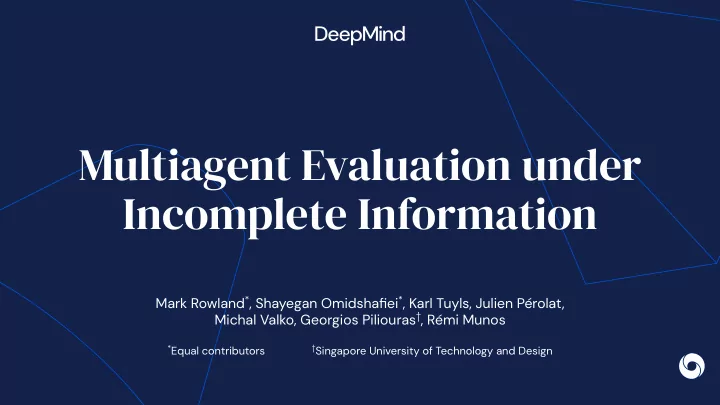

Multiagent Evaluation under Incomplete Information Mark Rowland * , Shayegan Omidshafiei * , Karl Tuyls, Julien Pérolat, Michal Valko, Georgios Piliouras † , Rémi Munos * Equal contributors † Singapore University of Technology and Design
Motivation ● Problem of interest: ○ Multiagent evaluation under incomplete information 3 ○ Agent evaluation >2-player, general-sum games with noisy payoffs Algorithm Estimated Estimated ranking vector payofg table 2 ● Prototypical application: multiagent iterative training Meta-game 1 synthesis Game simulation Training Train agents via simulations in the underlying game 1 Playing Construct meta-game comparing performance of all 2 agent match-ups Evaluate (i.e., rank or score) agents in the meta-game 3
Motivation ● Problem of interest: ○ Multiagent evaluation under incomplete information 3 ○ Agent evaluation >2-player, general-sum games with noisy payoffs Algorithm Estimated Estimated ranking vector payofg table 2 ● Prototypical application: multiagent iterative training Meta-game 1 synthesis Game simulation Training Train agents via simulations in the underlying game 1 Playing Construct meta-game comparing performance of all 2 agent match-ups Evaluate (i.e., rank or score) agents in the meta-game 3
Multiagent Evaluation at a Glance 𝜷 -Rank Overview 1. Construct response graph capturing player-wise evolutionary deviations: graph over the pure strategy profiles, with directed edges if deviating player’s new strategy is a better-response (U,L) (U,C) (U,R) Player 2 L C R U 2, 1 1, 2 0, 0 (M,L) (M,C) (M,R) M 1, 2 2, 1 1, 0 Player 1 (D,L) (D,C) (D,R) D 0, 0 0, 1 2, 2
Multiagent Evaluation at a Glance 𝜷 -Rank Overview 1. Construct response graph capturing player-wise evolutionary deviations: graph over the pure strategy profiles, with directed edges if deviating player’s new strategy is a better-response (U,L) (U,C) (U,R) Player 2 L C R U 2, 1 1, 2 0, 0 (M,L) (M,C) (M,R) M 1, 2 2, 1 1, 0 Player 1 (D,L) (D,C) (D,R) D 0, 0 0, 1 2, 2
Multiagent Evaluation at a Glance 𝜷 -Rank Overview 1. Construct response graph capturing player-wise evolutionary deviations: graph over the pure strategy profiles, with directed edges if deviating player’s new strategy is a better-response (U,L) (U,C) (U,R) Player 2 L C R U 2, 1 1, 2 0, 0 (M,L) (M,C) (M,R) M 1, 2 2, 1 1, 0 Player 1 (D,L) (D,C) (D,R) D 0, 0 0, 1 2, 2 2. Perturb the response graph → evolutionary mutations ensuring a unique stationary distribution 3. Stationary distribution masses → 𝜷 -Rank
Multiagent Evaluation at a Glance 𝜷 -Rank Overview 1. Construct response graph capturing player-wise evolutionary deviations: graph over the pure strategy profiles, with directed edges if deviating player’s new strategy is a better-response (U,L) (U,C) (U,R) Player 2 L C R U 2, [1,2] 1, [1,2] 0, 0 (M,L) (M,C) (M,R) M 1, 2 2, 1 1, 0 Player 1 (D,L) (D,C) (D,R) D 0, 0 0, 1 2, 2 2. Perturb the response graph → evolutionary mutations ensuring a unique stationary distribution 3. Stationary distribution masses → 𝜷 -Rank
From Uncertainty in Payofgs to Rankings ● Key question: given confidence bounds on the payoff table entries, can we efficiently compute a range of plausible 𝜷 -Rank weights for the agents?
From Uncertainty in Payofgs to Rankings ● Key question: given confidence bounds on the payoff table entries, can we efficiently compute a range of plausible 𝜷 -Rank weights for the agents? Top-ranked agent when no payoff uncertainty ● Takeaway: need careful consideration of payoff uncertainties when ranking agents ●
Contributions Static sample complexity bounds quantifying # of interactions needed to confidently rank agents 1 Algorithm that adaptively simulates agent interactions that are most informative for ranking 2 Analysis of the propagation of payoff uncertainty to the final rankings computed 3 Sample complexity guarantees & efficient alg. for bounding rankings given payoff uncertainty ●
Details & evaluations at poster #220!.
Recommend
More recommend